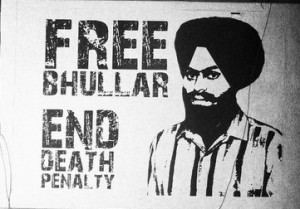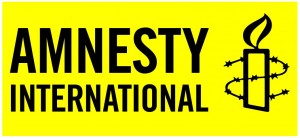General News
Sikh political prisoner Prof. Bhullar, Two Others face imminent execution in India; Amnesty India issues Urgent Action Appeal
August 20, 2013 | By Sikh Siyasat Bureau
New Delhi, India (August 20, 2013): According to a statement sent to Sikh Siyasat News (SSN) by Amnesty India’s media officer: [o]n 14 August, India ’s Supreme Court upheld its rejection of Devender Pal Singh Bhullar’s commutation plea. He is now at risk of imminent execution. The mercy petitions of two other men were also rejected by the President in August, and reports suggest they could be executed on 22 August.
 Devender Pal Singh Bhullar was sentenced to death in August 2001 for his involvement in a bomb attack in New Delhi in 1993 that killed nine people. He was arrested under the Terrorist and Disruptive Activities (Prevention) Act (TADA), a law that contained provisions incompatible with international fair trial standards, and had no access to a lawyer during his initial detention and trial. He was found guilty on the basis of a “confession” to the police which he later retracted, claiming it was made under police pressure. In March 2002, the Supreme Court upheld his death sentence, though one of the three judges had found him not guilty, saying there was no evidence to convict him.
Devender Pal Singh Bhullar was sentenced to death in August 2001 for his involvement in a bomb attack in New Delhi in 1993 that killed nine people. He was arrested under the Terrorist and Disruptive Activities (Prevention) Act (TADA), a law that contained provisions incompatible with international fair trial standards, and had no access to a lawyer during his initial detention and trial. He was found guilty on the basis of a “confession” to the police which he later retracted, claiming it was made under police pressure. In March 2002, the Supreme Court upheld his death sentence, though one of the three judges had found him not guilty, saying there was no evidence to convict him.
 The President rejected Devender Pal Singh Bhullar’s mercy petition in May 2011, eight years after the request was filed. This decision was challenged before the Supreme Court, including on grounds of an inordinate delay in the consideration of his mercy petition. The Supreme Court rejected his plea on 12 April, in a judgement that ignored claims he had been subjected to cruel, inhuman or degrading treatment or punishment. A review petition of this judgment was dismissed on 14 August 2013. Devender Pal Singh Bhullar has been receiving treatment at a psychiatric facility, and a medical board has reportedly stated that he is suffering from severe depression and shows symptoms of psychosis and suicidal tendencies. International standards on the use of the death penalty prohibit the use of capital punishment against people with mental disability.
The President rejected Devender Pal Singh Bhullar’s mercy petition in May 2011, eight years after the request was filed. This decision was challenged before the Supreme Court, including on grounds of an inordinate delay in the consideration of his mercy petition. The Supreme Court rejected his plea on 12 April, in a judgement that ignored claims he had been subjected to cruel, inhuman or degrading treatment or punishment. A review petition of this judgment was dismissed on 14 August 2013. Devender Pal Singh Bhullar has been receiving treatment at a psychiatric facility, and a medical board has reportedly stated that he is suffering from severe depression and shows symptoms of psychosis and suicidal tendencies. International standards on the use of the death penalty prohibit the use of capital punishment against people with mental disability.
Since taking office, President Pranab Mukherjee has rejected mercy petitions of at least 19 people. Information about the rejection of mercy petitions is not publicly available, making it difficult to determine the status of individual cases.
In August, the President rejected the mercy petitions of Shivu and Jadeswamy, who were sentenced to death in July 2005 for the rape and murder of a woman in 2001. The Karnataka High Court upheld the sentence in October 2005 and the Supreme Court upheld it in February 2007. In November 2012, the Supreme Court, in a different case relating to the imposition of the death penalty, observed that in Shivu and Jadeswamy’s case, “the circumstances of the convicts were not considered for reducing the death penalty” – a necessary measure courts are required to take under Indian law before sentencing anyone to death.
Their executions have been reportedly scheduled for 22 August. On 21 August, the Supreme Court will hear petitions from Shivu and Jadeswamy seeking commutation of their sentence on the grounds that the six-year delay in consideration of their mercy petitions was inordinate.
On 22 October, a larger bench of the Supreme Court will begin hearing together the cases of at least 17 other convicts who are seeking commutation of their death sentences on similar grounds.
***
Amnesty India has issued an urgent action appeal calling upon the people to raise immediate concerns against these suspected executions by wiring letters to the President, Prime Minister and Minister of Home Affairs, India. Amnesty India’s appeal in this regard reads as follows:
Please write immediately in English or your own language:
– Calling on Indian authorities not to execute Devender Pal Singh Bhullar, Shivu and Jadeswamy or any other prisoners
– Calling on Indian authorities to retry Devender Pal Singh Bhullar’s case in proceedings that meet international fair trial standards;
– Urging them to immediately halt any further executions, commute all death sentences to terms of imprisonment, and establish an official moratorium on executions with a view to abolishing the death penalty.
PLEASE SEND APPEALS BEFORE 30 SEPTEMBER 2013 TO:
President of India
Mr. Pranab Mukherjee
Rashtrapati Bhawan
New Delhi 110001 India
Fax: +9111 2301 7290
Email: (via form)
http://www.helpline.rb.nic.in/GrievanceNew.aspx
Salutation: Dear PresidentPrime Minister
Dr Manmohan Singh
South Block, Raisina Hill
New Delhi 110001 India
Fax: +9111 2301 9545
Email: (via form)
http://pmindia.nic.in/feedback.php?ln=english
Salutation: Dear Prime MinisterAnd copies to:
Minister of Home Affairs
Mr. Sushilkumar Shinde
104 North Block
Central Secretariat
New Delhi 110001 India
Fax: +9111 2309 4221
Email: hm@nic.in
***
AMNESTY INTERNATIONAL INDIA URGENT ACTION
Three men face imminent execution in India – Additional Information
In the Indian justice system, a mercy petition is often the final opportunity for individuals to have their death sentences commuted by the executive, after the judicial appeals have been exhausted. In the past, some mercy petition decisions have been challenged before the higher judiciary on grounds of undue delay by the executive in the consideration of such petitions. However, the decision to hear such a challenge is left to the discretion of the higher judiciary. In April 2012, the Supreme Court, while upholding Devender Pal Singh Bhullar’s death sentence, stated that delay “cannot be invoked in cases where a person is convicted for an offence under TADA or similar statutes”. The court decided not to commute the death sentence based on the “enormity of the crime”.
Since assuming office in 2012, President Pranab Mukherjee has rejected mercy petitions of at least 19 people – Ajmal Kasab, Saibanna, Afzal Guru, Gnanprakasham, Simon, Meesekar Madaiah, Bilavendran, Suresh, Ramji, Gurmeet Singh, Sonia Choudhary, Sanjeev Choudhary, Jafar Ali, Dharam Pal, Praveen Kumar, B A Umesh, Maganlal Barela, Shivu and Jadeswamy .
India has executed two of these individuals: Ajmal Kasab on 21 November 2012 and Afzal Guru on 9 February 2013. These two executions were considered out of turn and were not announced to the public until they had been carried out. A government minister stated that no prior announcement was made in Ajmal Kasab’s case to avoid intervention from human rights activists. In Afzal Guru’s case, the family only received notification of the execution after it had been carried out, and the body was not returned to them for burial. Prior to these, the last execution in India had been that of Dhananjoy Chatterjee in August 2004.
Of the remaining cases, Santhan, Murugan, Perarivalan, Gnanaprakasam, Simon, Madaiah and Bilavendran were originally convicted by a TADA court.
Indian authorities used to make information about the rejection of mercy petitions and dates of execution available to the public before any executions. However they have stopped this practice since 2012, making it difficult to know which mercy petitions are being considered, when decisions are be made, and whether these decisions would be public. In resolution 2005/59 the UN Commission on Human Rights called upon all states that still maintain the death penalty “to make available to the public information with regard to the imposition of the death penalty and to any scheduled execution”.
India’s resumption of executions has set the country against regional and global trends towards abolition of the death penalty
As of today, 140 countries are abolitionist in law or in practice. Out of 41 countries in the Asia-Pacific region, 17 have abolished the death penalty for all crimes, 10 are abolitionist in practice and one – Fiji – uses the death penalty only for exceptional military crimes. Over the past 10 years, four Asia-Pacific countries abolished the death penalty for all crimes: Bhutan and Samoa in 2004, the Philippines in 2006 and the Cook Islands in 2007. UN bodies and mechanisms have repeatedly called upon member states to establish a moratorium on executions with a view to abolishing the death penalty, including through the adoption of four UN General Assembly resolutions in December 2007, 2008, 2010 and 2012. India voted against all four resolutions
Amnesty International opposes the death penalty in all cases as a violation of the right to life and the ultimate cruel, inhuman and degrading punishment, regardless of the nature of the crime; guilt, innocence or other characteristics of the individual; or the method used by the state to carry out the execution.
To Get Sikh Siyasat News Alerts via WhatsApp:
(1) Save Our WhatsApp Number 0091-855-606-7689 to your phone contacts; and
(2) Send us Your Name via WhatsApp. Click Here to Send WhatsApp Message Now.
Sikh Siyasat is on Telegram Now. Subscribe to our Telegram Channel
Related Topics: Amnesty International, Death Penalty, Indian State, Prof. Bhullar, Prof. Devender Pal Singh Bhullar




